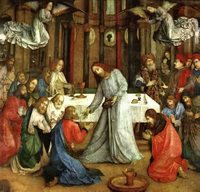Recently I have been grappling over several issues that have actually disturbed me for the better part of ten years. Since my wife and I have been visiting so many different churches in various denominations in our search for a church home (which by the way has now moved beyond the year mark) this issue has surfaced time and again. What issue is that?
Well, the issue of using the Bible to serve an end or purpose with which the Bible was not written. For instance, lately I have heard the Bible being
used or quoted from in order to debunk certain practices, either within society at some level, or within certain denominations. It is as if the Bible is being used to debunk something that, in all reality, the Bible was never intended to debunk. If this occurs within a particular denomination, often times the end result is division, splintering, sometimes to such a degree that several groups are formulated from what once was a larger whole. Each group now has its own Biblical view or interpretation that believes the other group, from which it broke off, is in error. This is certainly a misuse of the texts of Scripture. Nonetheless, it happens all too often.
Certainly the texts of the Bible, which were written thousands of years ago, were never intended to be used to demonstrate the personal preferences, or personal woes one may have with a group of contemporary believers (i.e. a certain church practices, etc.) Often the cry, “The Bible says such and such . . . therefore, you should do such and such” is a distorted and forceful misreading (usually done so quite anachronistically) of the texts. Moreover, these “militant” uses of the texts to “warn” a church (or group of Christians) in the 21st century are done so in an attempt to control the environment and not to get at the heart of what the text is truly communicating.
Authority of the Bible, in this sense or use, has become an equivocation of the term
authority. The “authority” is actually the attempt to use the Bible to express protest against a certain disagreement which misses the point of the text altogether.
Do you see this occurring or am I way off?

















